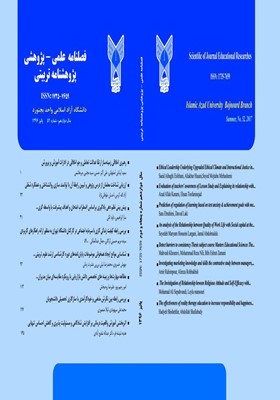Prediction of regulation of learning based on test anxiety & achievement goals with mediation of information processing strategies
Subject Areas : Educational Sciencesara ebrahimi 1 , davod laki 2 *
1 - دانشآموخته دکتری روانشناسی تربیتی، گروه روانشناسی، دانشگاه شهید بهشتی، تهران، ایران
2 - . دانشجوی دکتری روانشناسی تربیتی، گروه روانشناسی عمومی و تربیتی، دانشگاه آزاد اسلامی، واحد علوم و تحقیقات تهران، ایران (نویسنده مسئول)
Keywords: test anxiety, Key words: self-regulated learning, external regulation, information processing strategies, mastery goals, performanc-approach goals, performance-avoidance goals,
Abstract :
Many learning difficulties are due to the lack of cognitive and metacognitive skills in students, while learning and study skills are educable. The purpose of this study is to know the causes of some learning problems to help teachers and students with identifying the role of motivational structures and information processing strategies in regulation of learning (self-regulated learning and external regulation). For this purpose, the present study was conducted with a correlation design on a population of 492 third grade students of human science, experimental science, and mathematic physics in Noor in 1394-1395 that the sample of 264 students were selected based on a multistage cluster random sampling. Our questionnaires in this study consisted of regulation of learning subscale from Inventory of Learning Styles (Vermunt, 1998), test anxiety from Motivated Strategies for Learning Questionnaire (Pintrich & Degroot, 1994), Achievement Goals Scale (Midgley، Kaplan , Middleton & Maehr, 1998) and learning strategies from Motivated Strategies for Learning Questionnaire (Pintrich & Degroot, 1994). The structural equations model has been used for data analysis. The results indicated that test anxiety and achievement goals have significant effects on the deep and surface information processing strategies and information processing strategies have significant effects on regulation of learning. In result test anxiety and achievement goals predict significantly regulation learning by mediating of effects on the information processing strategies.
_||_

